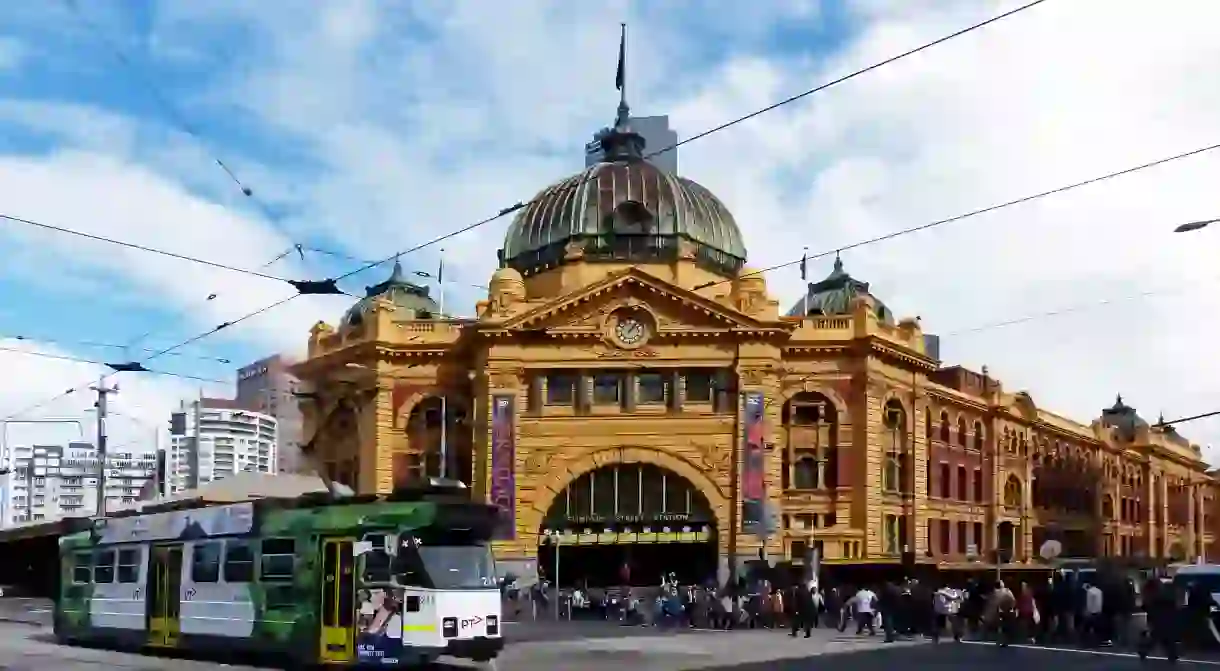12 Things You Didn't Know About Flinders Street Station, Melbourne

Since 1854, Flinders Street Station has been the heart of Melbourne and has gone on to become one of the most iconic buildings in the city, but did you know that it was first train station built in any Australian city, or that it’s haunted by a ghost named George? Culture Trip has uncovered these fascinating titbits about Flinders Street Station to read while sitting under the clocks.
First Station in Australia
Opened on September 12th 1854, Flinders Street Station was the first railway station built in any Australian city. Melbourne Terminus, as it was called then was a collection of weatherboard sheds and on opening day, the first steam train journey in Australia left from the station to Sandridge (now Port Melbourne).
Busiest Station in the World
By 1926, Finders Street Station became the busiest passenger station in the world, surpassing Gare Saint-Lazare in Paris, Grand Central Station in New York and Liverpool Street Station in London. On the January 11th 1922, The Argus Newspaper reported 200,000 passengers passed through the station in one day.

ACMI Exhibition Gallery
ACMI’s Gallery 1 was created by converting the terminals for the Epping and Hurstbridge Lines at Princes Bridge Railway Station, which was incorporated into Flinders Street Station as platforms 14, 15 and 16 in June 1980. The 87-meters long space now holds major exhibitions.
Mistaken Identity
A widely reported urban myth is that the design for Flinders Street Station was intended for Mumbai and the design for the Chhatrapati Shivaji Terminus (originally named Victoria Terminus) in Mumbai was meant for Melbourne. In 1899, a competition was held for the design of a new station in Melbourne. First prize was awarded to James Fawcett and HPC Ashworth who won £500 for their French Renaissance ‘Green Light’ project. It has long been reported that the plans were switched resulting in a Gothic style station in India and a vaguely East-Indian style building in Melbourne.

Haunted Station
Commuters have reported seeing a man on platform 10 holding fishing gear, seeming somewhat disoriented as he gazes out at the Yarra River before vanishing into thin air. Known as George, many believe the ghostly figure has been around since the days of Melbourne’s settlement, whereas others believe he is the spirit of George Mansfield, later identified as Ernest Leahy who was pulled from the river on 21st October 1902 after a boating accident.
Abandoned Ballroom
Above Flinders Street Station, an abandoned ballroom sits in ruin. Located on the third floor, the once grand Ballroom held dance classes, ballroom competitions and concerts with the capacity to seat 400 people. During WWII, dances were held for Allied servicemen and in the 50s and 60s, it was one of the most popular dance halls in Melbourne. The last dance was held on September 10th 1983 and it has since been closed off to the public.
Gymnasium
Next door to the ballroom is a derelict gymnasium which was once used by the station’s male employees and featured a boxing ring and billiards room. Flinders Street Station also has 440 yards long rooftop running track and it is completely normal to see men running across the station roof.
Film Credits
Flinders Street Station has appeared on screen in films including Squizzy Taylor (1982) and On The Beach (1959) which starred Gregory Peck, Ava Gardner, Fred Astaire and Anthony Perkins. It also featured in the background of Steven Spielberg’s TV mini-series The Pacific.
The Nursery
In June 1933, the Railways Department established The Children’s Nursery featuring three cot rooms, two play rooms, a kitchen and a rooftop playground. The childcare facility was used by mothers visiting the city. In 1937, a polio outbreak led to the closure of the nursery and by 1942 it was permanently closed.
Longest Platform in Australia
At 708 meters, platform 1 is the longest train platform in Australia and is reportedly the fourth longest in the world. Stretching two city blocks from Swanston Street to Queen Street, the platform services the South Morang and Hurstbridge lines. Once upon a time, platform 1 was home to the Milk Dock and the Parcels Office and up until 1986, most of Melbourne’s milk was unloaded here off trains from Gippsland.

Heated Steps
Under the clocks has always been a popular meeting point for Melbournians and is often a congregation point for subcultures, but did you know that the steps are heated? Former Victorian secretary of the Construction, Forestry, Mining and Energy Union, Martin Kingham, revealed that when he worked on the station’s refurbishment in the late 80s, the builders incorporated heating into the steps so that those sitting there wouldn’t get cold.
Under the Clocks
A fixture of the station’s façade, the clocks date back to the 1860s and continue to display departure times today. There was once a time when the clocks were manually operated by a railway officer who was tasked to change times on average of 900 times over an eight hour day. Now they are run automatically.














